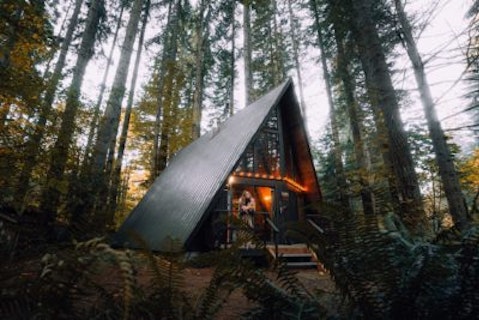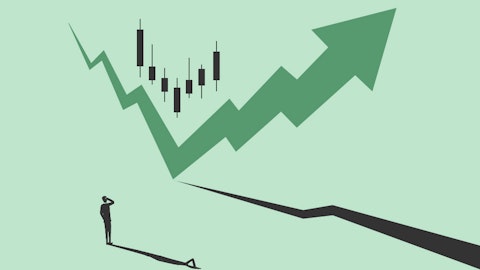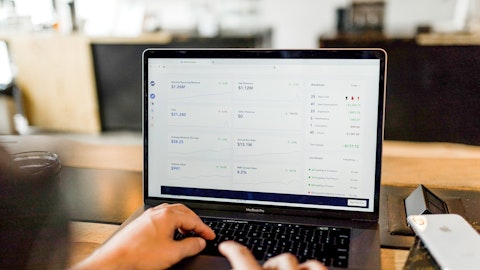Airbnb, Inc. (NASDAQ:ABNB) Q2 2023 Earnings Call Transcript August 3, 2023
Airbnb, Inc. beats earnings expectations. Reported EPS is $0.98, expectations were $0.77.
Operator: Good afternoon, and thank you for joining Airbnb’s earnings conference call for the Second Quarter of 2023. As a reminder, this conference call is being recorded and will be available for replay from the Investor Relations section of Airbnb’s website following this call. I will now hand the call over to Ellie Mertz, VP of Finance. Please go ahead.
Ellie Mertz: Good afternoon, and welcome to Airbnb’s Second Quarter of 2023 Earnings Call. Thank you for joining us today. On the call today, we have Airbnb’s Co-Founder and CEO, Brian Chesky; and our Chief Financial Officer, Dave Stephenson. Earlier today, we issued a Shareholder Letter with our financial results and commentary for our second quarter of 2023. These items were also posted on the Investor Relations section of Airbnb’s website. During the call, we’ll make brief opening remarks, and then spend the remainder of time on Q&A. Before I turn it over to Brian, I would like to remind everyone that we’ll be making forward-looking statements on this call that involve a number of risks and uncertainties. Actual results may differ materially from those expressed or implied in the forward-looking statements due to a variety of factors.

Photo by Karsten Winegeart on Unsplash
These factors are described under Forward-looking Statements in our Shareholder Letter and in our most recent filings with the Securities and Exchange Commission. We urge you to consider these factors and remind you that we undertake no obligation to update the information contained on this call to reflect subsequent events or circumstances. You should be aware that these statements should be considered estimates only and are not a guarantee of future performance. Also during this call, we will discuss some non-GAAP financial measures. We provided reconciliations to the most directly comparable GAAP financial measures in the Shareholder Letter posted to our IR website. These non-GAAP measures are not intended to be a substitute for our GAAP results.
With that, I will pass the call to Brian.
Brian Chesky: All right. Thank you Ellie. And Good afternoon, everyone. Thanks for joining today. I’m excited to share our results with you. Q2 was another strong quarter for Airbnb. We had over 115 million nights and experiences booked. Revenue of $2.5 billion grew 18% year-over-year. And when you exclude foreign exchange, our revenue increased 19% year-over-year. Net income was $650 million, representing a net income margin of 26%, our highest second quarter ever. And free cash flow for the quarter was $900 million, up 13% year-over-year. In fact, on a trailing 12-month basis, our free cash flow was $3.9 billion. And this represented a trailing 12-month free cash flow margin of 43%. And because of our strong cash flow and balance sheet, we were able to repurchase $2.5 billion of our stock in the last 12 months, which is more than offset the impact of shared dilution.
Now, during the quarter, we saw a number of positive business trends. First, guest demand in Airbnb remained strong. Nights and experiences booked increased 11% in Q2 compared to a year ago. Active bookers grew in every region, and we had more first-time bookers compared to a year ago. In fact, we’ve now had more than 1.5 billion guest arrivals since starting Airbnb. Second, guests are traveling farther. Cross-border nights booked increased 16% in Q2 compared to a year ago. And we are especially encouraged by the continued recovery of Asia Pacific, where inbound international travel increased 80% compared to this time last year. And we also saw cross-border nights booked to North America increase 20% year-over-year. And finally, the third trend we’re seeing is that guests are staying longer on Airbnb.
Millions of people remain flexible about where they live and work, and we see this reflected in our bookings. In Q2, long-term stays remain 18% of total nights booked. And throughout the quarter, we saw an acceleration in year-over-year growth in bookings for month these days. Now, while the ability to travel and work remotely has been an important part of long-term stay growth, people are also extending their typical weekend stays by an extra night or two. In fact, in the past six quarters, long stays, long weekend stays have been the fastest growing trip type on Airbnb. I think this is just evidence of the incremental flexibility people have post-pandemic. Now, given that we’re halfway through 2023, I just want to provide a very quick update on the progress we made across our three strategic priorities.
First, we are focused on making hosting mainstream. With supply growth stagnated at the beginning of COVID, we developed a new strategy to recruit more hosts. Since then, we’ve been focused on raising awareness around hosting, making it easier to get started, and improving our tools for hosts. And our strategy is working. In Q2, supply growth is 19% year-over-year, and this is actually up from 18% in Q1. In fact, in every quarter since we’ve gone public, we’ve seen an acceleration in total active listings growth. And we’re continuing to see strong supply growth across all regions, all market types, and all price points. In fact, we added a record number of new listings in Q2, and we ended the quarter with more than 7 million total active listings.
Second, we’re perfecting our core service. We want people to love our service, and that means obsessing over every detail. Millions of people have given us feedback on how to improve Airbnb. We’ve listened. On May 3rd, we introduced over 50 new features and upgrades as part of our 2023 summer release. Now many of these new features and upgrades were aimed at addressing affordability, starting with new pricing tools for hosts. Hosts told us that our pricing tools are difficult to use. So we redesigned our tools, and we made it easier for hosts to add discounts and promotions. They also told us that they had trouble setting competitive prices. So we added a new feature called similar listings to help them see listings in their area so they know what to charge.
Now we received very positive feedback from our hosts, and the changes are already having an impact. Hosts have started lowering their prices, and and with more of them offering weekly and monthly discounts. And as more hosts adopt these tools, we believe we’ll be able to drive greater affordability and value for guests. We also rolled out more affordable monthly stays. Guests are staying longer in Airbnb. So we took steps to make longer stays more affordable. We significantly reduced fees for stays longer than three months. We started offering U.S. guests the option to save money by paying with their bank account, and we made it easier for hosts to offer monthly discounts. And as a result, the percentage of our new active listings to offer monthly discount jumped from 22% to 50%.
Now we took another step to address affordability with the launch of Airbnb rooms. Airbnb rooms takes us back to our founding ethos of sharing, and it’s one of the most affordable ways to travel. Airbnb rooms have an average price of only $67 per night, significantly lower than the average hotel room. Given the increased price sensitivity for many guests, especially the next generation of travelers, this is going to remain an important category for Airbnb. And finally, our third strategic priority is to expand beyond the core. We spent the past few years perfecting our core service. We’ve rolled out hundreds of new features and upgrades. And today, our core is stronger and more profitable than ever, but we’re not stopping there because we have some big ideas for where to take Airbnb next.
And we’re building the foundational capability for these new product and services that we plan to launch in the years to come. Now, before I turn to Q&A, I want to tell you about a recent campaign that highlights what makes Airbnb unique. Airbnb is known for one of a kind listings. As I’m sure you know, the Barbie movie just came out in theaters. And in celebration of the premiere, we partnered with Warner Brothers and Mattel to transform a home into the Barbie Malibu Dreamhouse. And we launched it as part of our Only on Airbnb campaign. Only on Airbnb caps in the global pop culture moments, inspiring guests with some of the most iconic homes in the world. The Barbie Malibu Dreamhouse has been a sensation, and it is now Airbnb’s most popular listing ever.
We saw 13,000 press hits and more than 250 million social media impressions since it was announced. And to give you a sense of how much that is, that is twice, more than twice as many press hits as were generated from our IPO. Only on Airbnb campaigns are an effective way to introduce Airbnb and our unique inventory to new guests, and they’ll be an important part of our playbook going forward. So those are the results that we have to share for Q2. And with that, Dave and I look forward to answering your question.
See also 15 Countries with the Most IKEA Stores Worldwide in 2023 and 12 Best Summer Stocks To Buy Now.
Q&A Session
Follow Airbnb Inc. (NASDAQ:ABNB)
Follow Airbnb Inc. (NASDAQ:ABNB)
Receive real-time insider trading and news alerts
Operator: Thank you. [Operator Instructions] We’ll go to our first question from Mario Lu at Barclays.
Mario Lu: Great. Thanks for taking question. So the first one is on the third quarter ADR guide. You said it’s upward pressure in the quarter. Can you help explain what you mean by the listing type mix shift that’s kind of listing up ADRs?
Brian Chesky: Yes, the listing type mix shift is just simply the mix of types of listings, either geographic type of size of home location, that’s right in the mix. And so ADRs coming up due to that. And it’s also being coming up in the third quarter driven by foreign exchange.
Mario Lu: Okay, got it. And then in terms of your section on the operational take rate, you guys mentioned that you’re offering a lower take rate, especially for stays after the third month. Does that mean, over time, should we expect this number to come down? Or are there kind of offsets that you’re going to provide to keep the operational take rate flat? Thanks.
Brian Chesky: Yes, that’s Mario. I can answer that. We always want to make sure that we’re providing the very best value for our guests. We identified this is a huge opportunity where we could drive incremental conversion by taking take rates down after the third month. And we saw some really great results. That being said, I do not expect our take rates to change materially. There may be some segments or trip types or geographies where we would want to take it down, but that could be offset by other areas that could come up. And so generally, I would expect it to be pretty stable. And the way that we’re going to see margin expansion is by launching incremental services for guests and hosts over the coming years.
Mario Lu: Great. Thank you.
Operator: We’ll move next to Jed Kelly at Oppenheimer.
Jed Kelly: Hey, great, great. Thanks for taking my question. Just following up on the listing pipe, are you still adding more of that like vacation rental single unit inventory versus some of like call it the smaller units and urban vacation and urban areas? And then can you just give us an update on how we should think about your marketing into the back half? Thank you.
Brian Chesky: Yes. Hey, Jed, I can start and I’ll hand over to Dave. So our supply, I mean, let me just back up, our supply has actually been really, really strong. You might remember that being a COVID, we were, we flagged this as something we need to work on. That’s why we created an initiative called mainstreaming hosting. And the results have been very successful. In fact, supply growth is growing 19% year-over-year. And in fact, urban is actually growing faster in vacation. Urban is growing 20% whereas vacation is growing 19%. So that is pretty stable. And as far as the number of individual hosts versus what we describe as professional hosts, around 90% of our hosts remain individuals. I’ll hand over to Dave.
David Stephenson: Yes, on the marketing back half, I mean, our marketing expenses as a percentage of revenue we expect to remain relatively flat year-over-year on a total year basis from 2023 over 2022. We did pull forward more marketing to the first half of the year relative to the second half this year. We’ve been really pleased with the results. So I mean, remember that 90% of our traffic remains direct or unpaid. I think that’s an important differentiator versus others. And then when we do things like the Barbie dream house and other big, events like that, we’re able to kind of drive more awareness about Airbnb about the uniqueness of our offerings. And this is a powerful strategy for our marketing.
Brian Chesky: Yes, maybe I’ll just add one thing about marketing is just, it’s a full funnel approach. And last year we got 600,000 articles written about us. So people talk a lot about Airbnb. And now I think what you’re also seeing is social media, whether it’s the only on program Barbie or just generally every means social media is just a topic of conversation. I think that is just a testament to when you invest in a brand, when your brand’s a noun and a verb, and you have something unique, you get a lot of those benefits. And I think it’s going to be consistent and we’ll have pretty consistent marketing expenses to send a revenue over time because of the strength of the brand.





